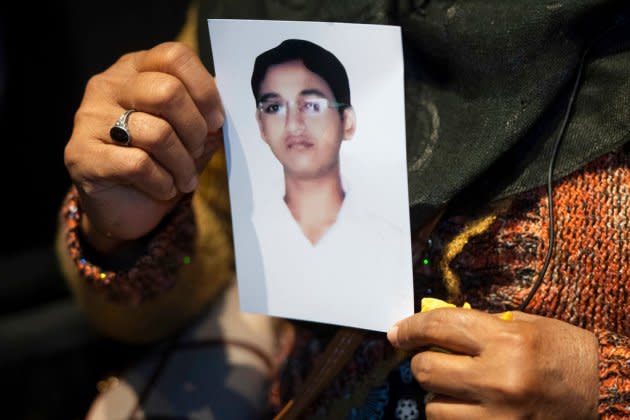Pakistan’s Own 9/11 Disaster Still Haunts Garment Sector

Nine years after a textile factory complex in the Pakistani city of Karachi erupted into flames, killing more than 250 workers and injuring 60 others, its victims and families are still seeking restitution.
The $5 million compensation fund, organized by the International Labour Organization and German discount chain KiK, Ali Enterprises’ main customer, has hit a distribution bottleneck, Saeeda Khatoon, chair of the Ali Enterprises Fire Affectees Association, said at a media briefing Thursday. “We have been asking them but our pleas have been in vain,” she said through a translator. “We haven’t forgotten our dead in these nine years. Can you forget your kids who have gone from the world like this? Nobody can.”
More from Sourcing Journal
Khatoon lost her only son, Aijaz, in the Sept. 11, 2012 inferno, Pakistan’s worst industrial accident and one that killed almost twice as many workers as the Triangle Shirtwaist Factory fire in New York a hundred years earlier. Still, there were chilling parallels. Survivors recalled locked emergency doors and windows with metal grilles that prevented workers from throwing themselves to safety. Passageways and stairs, they said, were stuffed with piles of finished garments, hindering movement. Those who managed to leap from the roof of the four-story building died or broke bones from the fall. Most of the trapped workers succumbed to smoke inhalation, their bodies burned beyond recognition when they were finally pulled out.
Labor organizations say little has changed in the ensuing years. Despite the international outcry, the country’s factories are no safer than they were nearly a decade ago and industrial accidents and deaths still occur on a regular basis. Seven months after the tragedy at Ali Enterprises, a factory collapse with an even larger death toll took its place in the media spotlight. But while the Rana Plaza disaster paved the way for the legally binding Accord on Fire and Building Safety in neighboring Bangladesh, transforming its once accident-prone industry into one of the world’s safest, there was no such trajectory shift for Pakistan.
“We have nobody to support us,” Khatoon said. “We have been raising our voices, taking to the streets these nine years to demand safety at workplaces but no one is paying heed to us. I feel like I’ve failed at making sure no one suffers like we have.”
The fire at Ali Enterprises, believed at first to be an accident but was later revealed to be an act of arson, was a stunning rebuke to the factory monitoring system. Mere weeks before the blaze, RINA, an Italian auditing group, had awarded the facility with the coveted SA8000 certification, which meant it met international standards for health and safety, minimum wages and other areas. Such voluntary box-checking exercises should no longer be the status quo, labor advocates say, not when the new International Accord for Health and Safety in the Textile and Garment Industry offers an alternative.
“We have been working together for five years now to work toward a legally binding agreement like the Bangladesh Accord,” said Khalid Mahmood, director of the Labour Education Foundation in Pakistan. “The International Accord, with the promise of expansion into other countries, is a very good opportunity for Pakistan as we are one of the biggest producers of garments and textiles. We are willing to work together with the government and employers in Pakistan and international brands to bring the Accord to Pakistan.”
Signatories of the International Accord, which include H&M, Zara owner Inditex and Calvin Klein parent PVH Corp., have pledged to extend the agreement to at least one other country within the first two years. The Accord Secretariat in Amsterdam will be conducting feasibility studies over the next six months for the right candidate.
“It makes a lot of sense for us to at least also look at Pakistan as a priority country but we will also be looking at other countries like India, Vietnam, Cambodia, possibly Turkey, Egypt [and] Morocco,” said Joris Oldenziel, deputy director of the International Accord Foundation. Whether a national body such as the Ready-made Garment Sustainability Council in Bangladesh will handle the inspection and remediation work remains to be determined, he added, but the “intention is to set up a structure that incorporates all stakeholders.”
There is an “extraordinary life-saving record of success” as a direct result of moving from corporate self-regulation to binding and enforceable worker safety commitments, said Scott Nova, executive director of the Worker Rights Consortium, a Washington D.C.-based labor-rights group.
“There are two potential paths forward for the garment workers of Pakistan, one is to retain the existing approach of corporate-run CSR programs, which failed to prevent the Ali Enterprises fire and failed to prevent so many other disasters, or to instead abandon that failed model and, as in Bangladesh, embrace the Accord model of binding worker safety commitments,” he said. “It’s obvious which choice should be made by the industry and by the workers of Pakistan.”
For the labor movement in Pakistan, enthusiasm for an Accord has never been greater. There is a shortage of inspectors in Bangladesh, and laws that were designed to protect workers are rarely enforced. Remediation efforts and safety improvements have also been inadequate.
“We have a very good law, which was formulated in 2017, the Health and Safety Act, in the province of Sindh, but there is no implementation [and] the inspection systems are horrible; we have only one-third of the inspectors that are required to go and inspect the factories,” said Karamat Ali, executive director of the Pakistan Institute of Labour Education & Research. “There are basic requirements that must be followed. Unless they are not followed, there will be no safety at workplaces in Pakistan.”
